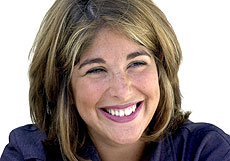
Far from being the Marx of the twenty-first century, Naomi Klein is a conspiracy theorist whose work depends on a partial reading of history and offers no constructive vision.
Leon Trotsky once said ‘war is the engine of history.’ He was half right. The violence, chaos and confusion of armed conflict does indeed frequently result in extremely rapid social change. Trotsky had seen the Russian monarchy swept away and a communist regime erected in its place because of the carnage of the Great War. Where he was wrong was to suggest that it was only war that could cause this kind of change, when any kind of upheaval, be it natural disaster, economic collapse or industrial conflict is capable of changing a nation beyond recognition. Look at any significant change in the course of history and it will invariably involve a crisis of some kind.
This is not something Naomi Klein seems to understand. She looks at the fact that the forward march of the market is linked with a series of ‘shocks’ and sees not a historical fact of life but a conspiracy. She believes that followers of Milton Friedman (who she considers fundamentalists) have ruthlessly exploited shocks like Hurricane Katrina, 9/11 and the 1973 Chilean coup to force their view on the world. Furthermore, she suggests that Friedmanite policies can only be fully implemented in an authoritarian state. Hardly any of this stacks up.
Crises do not necessarily bring about a reduction in the size of the state. Without the trauma of World War II we would probably never have had an NHS. Without the Great Depression we would never have had Keynesianism and New Deal liberalism. Miss Klein is herself part of a political movement that has its roots in the upheaval caused by the Vietnam War.
Should you use crisis to further your political ends? Klein appears to believe that you should not but confuses the point by unhelpfully eliding the actions of the Friedmanites with people profiteering from tragedies. One is clearly reprehensible, the other is more debatable. If we focus only on people using crises for what they perceive to be the interests of society rather than their own, then Klein has a problem. Is she seriously suggesting that the world would be a better place if Millicent Fawcett had decided in 1917 that because of the war in Europe now was not the time to get women the vote or if Keynes had decided that it was unfair to use the backdrop of the depression to propose his new economic theory? ‘Making the best of a bad situation’ is normally considered a virtue not a vice.
To characterise Friedman as a fundamentalist is a bit of stretch. He is willing to support a large number of measures to support the poor such as state funded schools and a negative income tax. Market fundamentalists do exist but they tend to be marginal figures like Murray Rothbard and Ayn Rand rather than the architects of Machiavellian conspiracies on a global scale.
Klein’s association of the market with violence and oppression does not stack up. By its very nature a market economy is less violent than its socialist alternative because it relies on voluntary co-operation rather than the coercive power of the state. The example that Klein relies on for this particular argument is the Pinochet regime in Chile, which is comparatively unusual. This is to my knowledge the only case where a regimes move from a command to a market economy has been accompanied by a significant increase in political violence. By contrast the construction of a command economy has hardly ever been achieved by a liberal democracy; it is almost invariably a product of dictatorship.
Probably the biggest problem with Klein’s work is that for all her evident passion and eloquence, she seems to have no interest of any kind in proposing a positive alternative to the market economy. An article in the Economist describes this flaw rather well:
“What is the superior alternative to capitalist development that Ms Klein proposes? She feels under no obligation to say. It is not her job to dictate to the movement. The most she can do, in all modesty, is to offer indications and observations; the people, thus empowered, must do the rest…Certainly, Ms Klein is for justice, “deep” decentralised democracy (not the false kind currently practised), autonomous spaces and diversity of every kind. All these things can presumably be reconciled with the ambitious goals she would doubtless wish to see pursued in welfare spending, environmental protection and income redistribution—aims which, on the face of it, call for a high degree of centralisation and some reduction in the amount of autonomous space—but readers and listeners are never told how this contradiction might be resolved.”
Klein's work gives a very distorted picture in which all the evil in the world is done at the bidding of Milton Friedman and the dubious record of her own side is never examined. It is ultimately a source of heat rather than light; making people angry but not suggesting what they should do about it. To use another Trotsky quote it is time to send the shock doctrine to the 'dustbin of history.'


